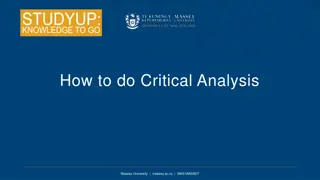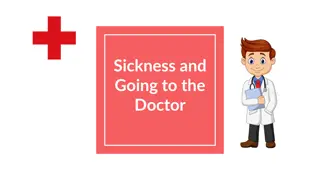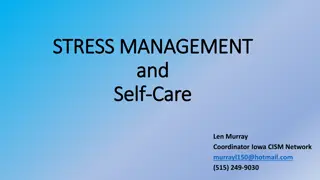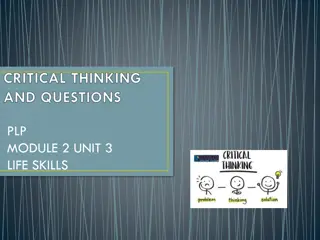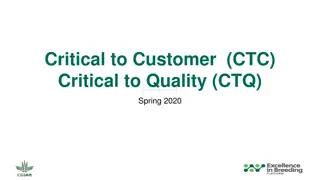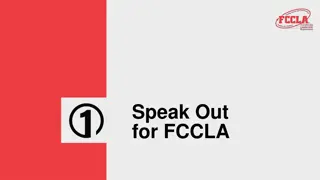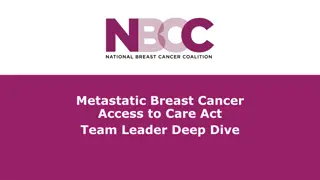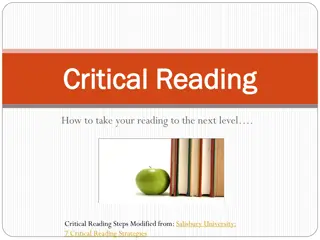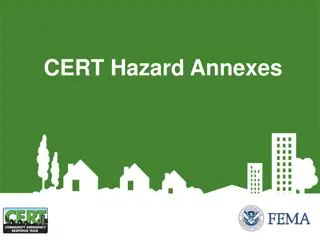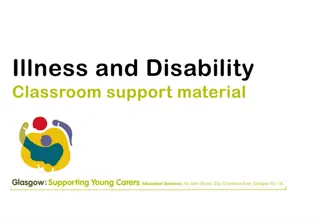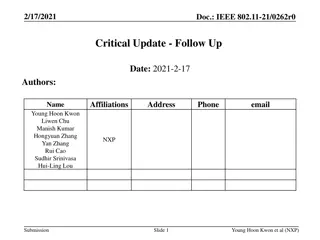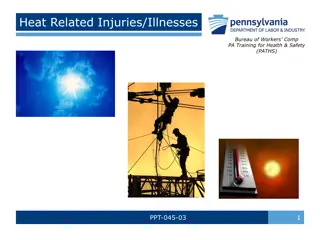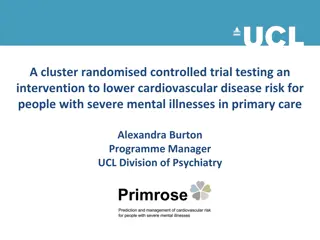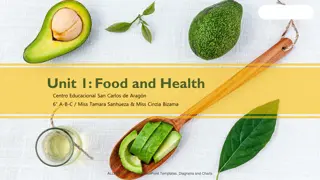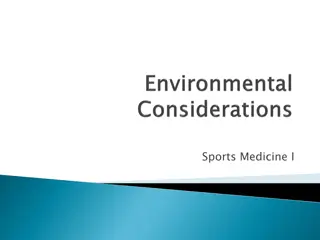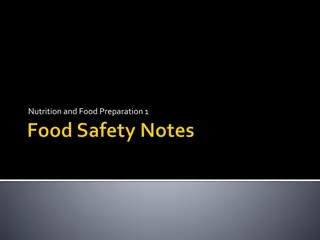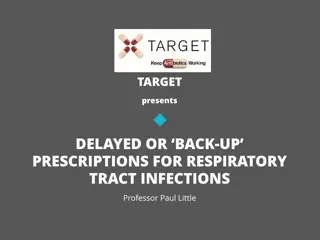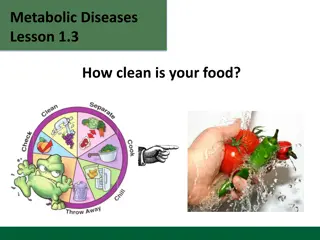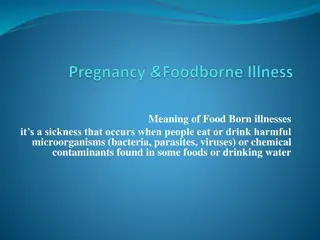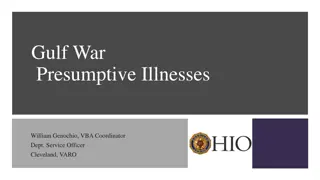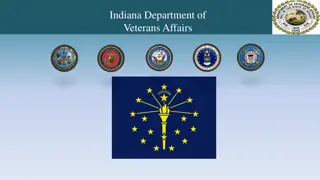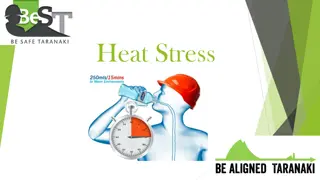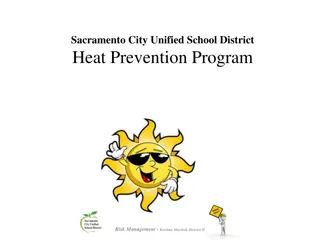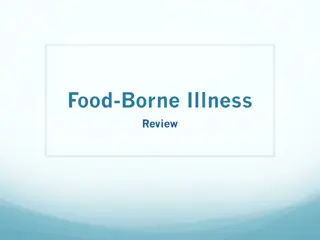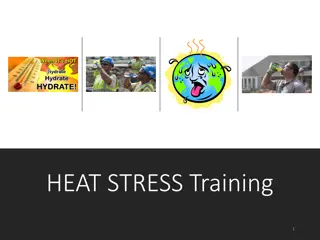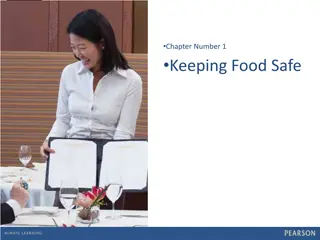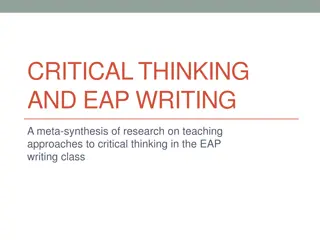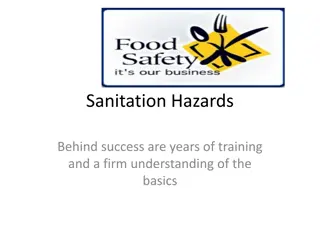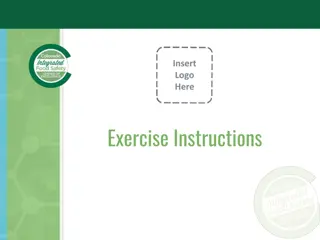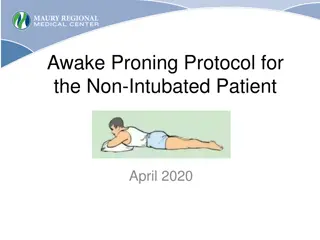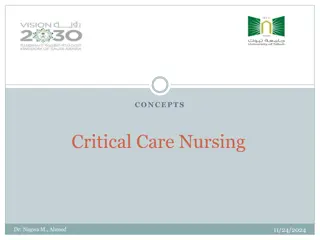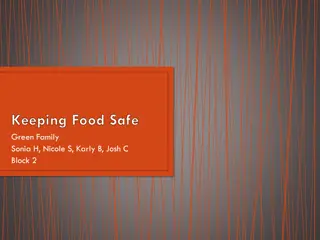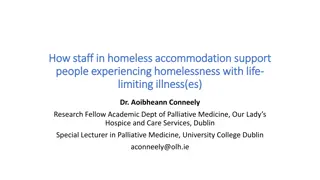Understanding Critical and Non-Critical Incidents in Incident Reporting
Critical incidents, as defined by regulations, are serious events that pose immediate risk to health, safety, or welfare. Non-critical incidents, on the other hand, are minor in nature and do not have serious consequences. Incident reports play a crucial role in documenting occurrences, identifying
0 views • 29 slides
Impact of Evidence-based Supported Employment on Health and Social Determinants
Providing evidence-based supported employment can positively impact social determinants of health by addressing economic stability, reducing risk factors for preventable illnesses, and improving access to quality healthcare. Employment plays a crucial role in mental health intervention and can help
3 views • 36 slides
How to do Critical Analysis
Massey University provides valuable insights on critical analysis, distinguishing between description and analysis, evaluating evidence and reasons, and making strong arguments. Critical thinking involves evaluating evidence to reach informed conclusions, surpassing mere understanding. While descrip
0 views • 22 slides
Understanding Common Illnesses and Health Advice
Explore various common illnesses like flu, fever, headache, cold, and their symptoms through images. Learn how to describe illnesses using verbs and match symptoms with the right illness. Additionally, discover health advice using "should" and "shouldn't" with appropriate illnesses.
1 views • 18 slides
Understanding Critical Incident Stress Management (CISM)
Critical Incident Stress Management (CISM) is crucial for addressing the emotional, physical, and psychological reactions to overwhelming events. This includes definitions of critical incidents, CISM teams, peer support, and crisis response teams. Learn how the International Critical Incident Stress
2 views • 25 slides
Enhancing Critical Thinking Skills Through KWHL Chart
Critical thinking entails questioning and seeking more information before accepting ideas. The KWHL chart method is introduced to improve critical thinking skills, encouraging students to note what they know, what they want to learn, how they can learn more, and what they have learned. Engaging in a
0 views • 5 slides
Understanding Critical to Customer (CTC) and Critical to Quality (CTQ)
Quality is determined by meeting customer needs. Critical to Customer (CTC) Flowdown translates these needs into Critical to Quality (CTQ) aspects. This tool helps organizations identify what is critical to meet customer expectations, serving as a communication tool and guiding improvement projects.
2 views • 10 slides
Exploring Critical Thinking in a Digital Society
Delve into the realm of critical thinking in the modern era, where information is readily available. Discover how easy access to data impacts our ability to think critically. Explore the importance of critical thinking and its application in today's society. Learn about the six-step critical thinkin
0 views • 32 slides
Evolution of Access to Healthcare Legislation for Critical Illnesses
Legislation has evolved over the years to improve access to healthcare for individuals with critical illnesses like ALS and metastatic breast cancer. Waiting periods were eliminated to ensure timely coverage, with strategic decisions made to involve key stakeholders in the process, ultimately leadin
0 views • 21 slides
Unlocking Critical Reading Skills: Strategies and Techniques
Enhance your reading comprehension through critical reading practices. Understand the definition of critical reading, its importance in the reading process, and learn practical steps to become a critical reader. Discover how critical reading fits into the C.A.R.E. model and the benefits it brings to
0 views • 26 slides
Extreme Heat Preparedness and Impacts: CERT Hazard Annexes
Introduction to CERT Hazard Annexes focusing on extreme heat, discussing heat-related illnesses, impacts of extreme heat, and preparedness measures including insulation, window protection, and attic fans. The content emphasizes the preventable nature of heat-related illnesses and the vulnerabilities
0 views • 26 slides
Understanding Illness and Disability for Young Learners
This learning module aims to develop young learners' understanding of illness and disability by distinguishing between long-term and short-term illnesses, recognizing various medical conditions, and fostering empathy through discussions and activities. Students will engage in tasks such as listing d
0 views • 18 slides
IEEE 802.11-21/0262r0 Critical Updates Discussion Summary
The document discusses critical updates related to IEEE 802.11-21/0262r0, focusing on changes in system information for APs within an AP MLD. It addresses scenarios where non-AP STAs receive Beacon frames with direct inclusion events, potential issues with updating critical information, and proposes
0 views • 9 slides
Understanding Foodborne Illness: Causes and Symptoms
Foodborne illnesses are diseases transmitted to humans through contaminated food, causing symptoms like nausea, vomiting, stomach cramps, fever, and diarrhea. These illnesses are mainly caused by pathogenic microorganisms such as bacteria, viruses, and parasites, often spread through mishandling of
0 views • 10 slides
Understanding Heat-Related Injuries and Illnesses in the Workplace
Learn about different types of heat injuries/illnesses, prevention tips, statistics, and who is affected by heat-related issues. Discover how heat stress occurs, the body's cooling system, and the dangers of heat stroke. This comprehensive guide will help you understand how to work safely in the sun
3 views • 46 slides
Cluster Randomised Controlled Trial for Cardiovascular Disease Risk in Severe Mental Illness
A cluster randomised controlled trial is being conducted to test an intervention aimed at reducing cardiovascular disease risk for individuals with severe mental illnesses in primary care settings. Led by Professor David Osborn at UCL Division of Psychiatry, the study is funded by the National Insti
0 views • 21 slides
Understanding Severe Mental Illness in Mothers: Impacts and Support
Mothers with severe mental illnesses like Schizophrenia face unique challenges in parenting. Support from partners, family, and the community is crucial for their well-being. Despite the difficulties, with proper treatment and support, women with severe mental illnesses can effectively fulfill their
3 views • 23 slides
Health Education Unit Overview
This educational unit focuses on identifying and using different illnesses, practicing the interrogative form of present continuous tense, and enhancing listening, speaking, and writing abilities. Students will learn about various common illnesses and how to form interrogative sentences in the prese
0 views • 10 slides
Learning About Common Illnesses - Health Lesson for Students
In this lesson, students will learn about common illnesses and how to describe symptoms like runny nose, headache, stomach ache, and chills. They will also understand proper ways to take care of themselves when sick and identify parts of a letter. The lesson includes engaging activities, new vocabul
0 views • 23 slides
Understanding Heat-Related Illnesses in Sports Medicine
Hyperthermia is a condition where body temperature is elevated, posing risks like heat stress and heat-related illnesses. Proper knowledge of factors like temperature, humidity, and hydration is crucial for athletes and coaches to prevent such conditions during workouts. Metabolic heat production, c
1 views • 29 slides
Food Safety and Prevention of Food-borne Illnesses
An estimated 48 million Americans suffer from food-borne illnesses yearly, caused by harmful microorganisms due to poor food handling practices. Factors contributing to food-borne illnesses include improper cooking, inadequate storage, and cross-contamination. To prevent such illnesses, it is essent
0 views • 23 slides
Antibiotics in Primary Care: Balancing Benefits and Risks
Antibiotics play a crucial role in healthcare, but their overuse can lead to medicalization of illnesses and unnecessary prescriptions. Evidence suggests limited symptom relief from antibiotics in certain conditions. Delayed or back-up prescriptions are recommended to reduce unnecessary antibiotic u
0 views • 34 slides
Food Safety and Preventing Food-borne Illness
This lesson focuses on the importance of food safety, addressing how clean our food is and at what points safety can be compromised. It delves into common types of microbes that contaminate foods and explores ways in which food safety can be compromised. The activity involves case studies on food sa
0 views • 11 slides
- Risks of Foodborne Illnesses During Pregnancy
- Pregnant women are at high risk of foodborne illnesses due to weakened immune systems. Such illnesses can lead to serious health issues for both mother and fetus, including miscarriage and premature delivery. Symptoms may include stomach-related discomfort, vomiting, and diarrhea. Immediate medica
0 views • 15 slides
Gulf War Presumptive Illnesses and Eligibility Requirements for Veterans
Gulf War Veterans who served in the Southwest Asia theater of military operations may be entitled to disability compensation for certain undiagnosed illnesses, chronic disability patterns, and presumptive diseases. Eligible Veterans can receive a free Gulf War Registry health exam to identify potent
2 views • 18 slides
Gulf War Veterans Disability Compensation Guide
Qualifying Gulf War veterans may be entitled to disability compensation for certain undiagnosed illnesses, chronic disability patterns, and presumptive diseases. Eligibility requirements include meeting specific conditions related to service-related disabilities or illnesses. The disabilities must f
0 views • 12 slides
Understanding Heat Stress and Prevention Techniques
Heat stress can lead to various heat-related illnesses and affect concentration at work. It's essential to be hydrated, wear appropriate gear, and monitor symptoms to prevent heat-related issues. Factors like hydration levels, environmental conditions, and personal health play a crucial role in mana
0 views • 11 slides
Heat Illness Prevention Plan for Sacramento City Unified School District
This plan outlines key elements for preventing heat-related illnesses in the Sacramento City Unified School District. It focuses on providing access to water, shade, training, and emergency response to reduce the risk of heat-related illnesses among employees. The plan includes steps to ensure emplo
0 views • 18 slides
Food Safety Review: Preventing Food-Borne Illness
Explore key aspects of food safety including the definition and symptoms of food-borne illnesses, categories of causes, common pathogens like Salmonella and E. coli, personal hygiene practices, proper food storage techniques, and thawing methods. Gain insights into preventing food-borne illnesses th
0 views • 11 slides
Heat Stress Training and Prevention Information
Learn about heat stress training, factors increasing the risk for heat-related illnesses, dehydration, early and later signs of heat-related illnesses, how to replace lost fluids, and how to manage heat cramps and exhaustion. Stay hydrated and recognize the signs to prevent heat-related issues in va
0 views • 20 slides
Understanding Food Safety: Essential Knowledge and Practices
Exploring the fundamentals of keeping food safe, this content covers topics such as foodborne illnesses, contaminants, food safety responsibilities, key terms like time-temperature abuse and cross-contamination, and high-risk populations. Discover how to identify foodborne illnesses and recognize fa
0 views • 22 slides
Overview of Classification of Psychiatric Disorders
Psychiatric disorders are illnesses with various manifestations that impact functioning due to disturbances in biological, social, genetic, and other factors. Two key classification systems, ICD-10 and DSM-5, categorize over 200 types of psychiatric illnesses. The ICD-10 includes categories like org
0 views • 18 slides
Enhancing Critical Thinking: Strategies and Practices Across Disciplines
Explore the multifaceted dimensions of critical thinking in teaching and learning across various disciplines. Uncover the importance of identifying assumptions, the role of different traditions in promoting critical thought, and practical techniques like the Circle of Voices. Discover how critical t
0 views • 16 slides
Enhancing Critical Thinking in EAP Writing: A Meta-Synthesis Study
Investigating the teaching approaches to critical thinking in EAP writing classes, this meta-synthesis research delves into the importance of critical thinking, key issues in the literature review, defining critical thinking, enhancing criticality in academic writing, and understanding critical thin
0 views • 14 slides
Importance of Sanitation in Food Handling
Behind culinary success lies years of training and a solid grasp of food safety basics. Unsafe food handling can lead to foodborne illnesses, outbreaks, and even legal consequences. Sanitation practices are crucial to prevent contamination and ensure food safety in professional kitchens, reducing th
0 views • 8 slides
Investigating Foodborne Illness Outbreaks Linked to Events
An organization is investigating outbreaks of foodborne illnesses associated with two different events: a wedding in Pueblo and the National Western Stock Show. The wedding outbreak involves confirmed cases of Norovirus, affecting several guests, while the stock show outbreak is linked to E. coli O1
0 views • 16 slides
Awake Proning Protocol for Non-Intubated Patients
Learn about the benefits, eligibility, contraindications, equipment needed, and protocol for awake proning in non-intubated patients. Discover how this positioning technique can improve oxygenation and patient outcomes during respiratory illnesses. Eligible patients include those with COVID-19, resp
0 views • 14 slides
Understanding Critical Care Nursing: Principles, Definitions, and Types of Units
Critical care nursing involves providing specialized and individualized care to patients with life-threatening conditions. The concept, principles, definitions, and types of critical care units are discussed, emphasizing the importance of early detection, prompt action, and anticipating patient need
0 views • 20 slides
Understanding Food Safety: Microorganisms, Illnesses, and Prevention
Explore the world of food safety through the lens of microorganisms, illnesses, and prevention methods. Learn about different types of bacteria that can cause foodborne illnesses, such as Clostridium Perfringens and Staphylococcus Aureus, and understand the distinction between food intoxication and
0 views • 12 slides
Supporting People Experiencing Homelessness with Life-Limiting Illnesses: A Research Perspective
This research discusses the support provided by staff in homeless accommodations for individuals facing homelessness and life-limiting illnesses. It covers the definitions and reasons for homelessness, the high risk of death in people experiencing homelessness, and common causes of mortality among t
0 views • 18 slides


